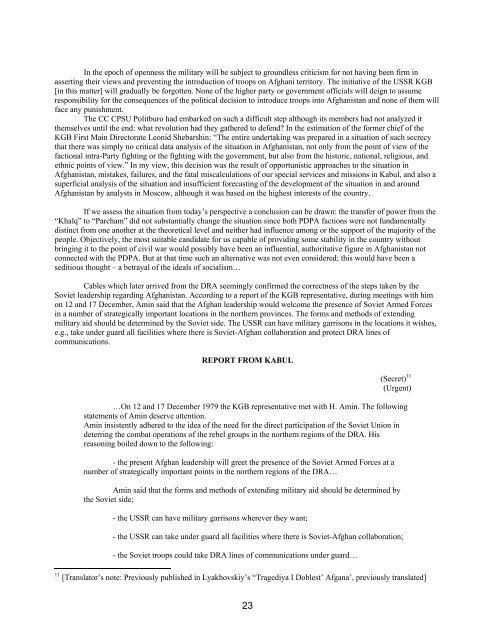Aleksandr Antonovich Lyakhovskiy Working Paper pp - Woodrow ...
Aleksandr Antonovich Lyakhovskiy Working Paper pp - Woodrow ...
Aleksandr Antonovich Lyakhovskiy Working Paper pp - Woodrow ...
You also want an ePaper? Increase the reach of your titles
YUMPU automatically turns print PDFs into web optimized ePapers that Google loves.
In the epoch of openness the military will be subject to groundless criticism for not having been firm in<br />
asserting their views and preventing the introduction of troops on Afghani territory. The initiative of the USSR KGB<br />
[in this matter] will gradually be forgotten. None of the higher party or government officials will deign to assume<br />
responsibility for the consequences of the political decision to introduce troops into Afghanistan and none of them will<br />
face any punishment.<br />
The CC CPSU Politburo had embarked on such a difficult step although its members had not analyzed it<br />
themselves until the end: what revolution had they gathered to defend In the estimation of the former chief of the<br />
KGB First Main Directorate Leonid Shebarshin: “The entire undertaking was prepared in a situation of such secrecy<br />
that there was simply no critical data analysis of the situation in Afghanistan, not only from the point of view of the<br />
factional intra-Party fighting or the fighting with the government, but also from the historic, national, religious, and<br />
ethnic points of view.” In my view, this decision was the result of o<strong>pp</strong>ortunistic a<strong>pp</strong>roaches to the situation in<br />
Afghanistan, mistakes, failures, and the fatal miscalculations of our special services and missions in Kabul, and also a<br />
superficial analysis of the situation and insufficient forecasting of the development of the situation in and around<br />
Afghanistan by analysts in Moscow, although it was based on the highest interests of the country.<br />
If we assess the situation from today’s perspective a conclusion can be drawn: the transfer of power from the<br />
“Khalq” to “Parcham” did not substantially change the situation since both PDPA factions were not fundamentally<br />
distinct from one another at the theoretical level and neither had influence among or the su<strong>pp</strong>ort of the majority of the<br />
people. Objectively, the most suitable candidate for us capable of providing some stability in the country without<br />
bringing it to the point of civil war would possibly have been an influential, authoritative figure in Afghanistan not<br />
connected with the PDPA. But at that time such an alternative was not even considered; this would have been a<br />
seditious thought – a betrayal of the ideals of socialism…<br />
Cables which later arrived from the DRA seemingly confirmed the correctness of the steps taken by the<br />
Soviet leadership regarding Afghanistan. According to a report of the KGB representative, during meetings with him<br />
on 12 and 17 December, Amin said that the Afghan leadership would welcome the presence of Soviet Armed Forces<br />
in a number of strategically important locations in the northern provinces. The forms and methods of extending<br />
military aid should be determined by the Soviet side. The USSR can have military garrisons in the locations it wishes,<br />
e.g., take under guard all facilities where there is Soviet-Afghan collaboration and protect DRA lines of<br />
communications.<br />
REPORT FROM KABUL<br />
(Secret) 11<br />
(Urgent)<br />
…On 12 and 17 December 1979 the KGB representative met with H. Amin. The following<br />
statements of Amin deserve attention.<br />
Amin insistently adhered to the idea of the need for the direct participation of the Soviet Union in<br />
deterring the combat operations of the rebel groups in the northern regions of the DRA. His<br />
reasoning boiled down to the following:<br />
- the present Afghan leadership will greet the presence of the Soviet Armed Forces at a<br />
number of strategically important points in the northern regions of the DRA…<br />
Amin said that the forms and methods of extending military aid should be determined by<br />
the Soviet side;<br />
- the USSR can have military garrisons wherever they want;<br />
- the USSR can take under guard all facilities where there is Soviet-Afghan collaboration;<br />
- the Soviet troops could take DRA lines of communications under guard…<br />
11 [Translator’s note: Previously published in <strong>Lyakhovskiy</strong>’s “Tragediya I Doblest’ Afgana’, previously translated]<br />
23

















